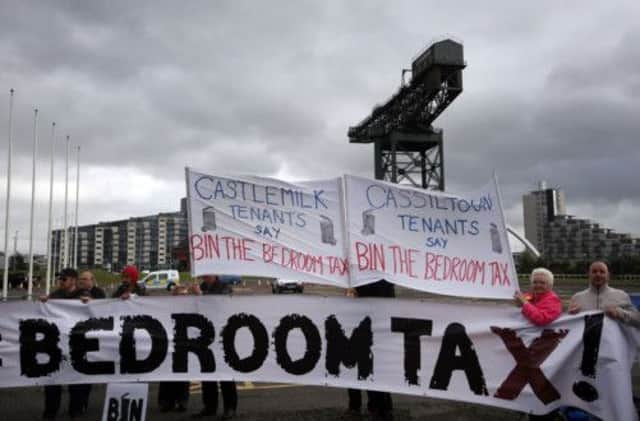Bedroom tax: Tenants in Scotland among hardest hit


Eight of the 20 British local authorities that responded which have suffered the biggest impact are north of the Border, according to the study.
The TUC said tax had tipped nearly one in three affected council tenants into rent arrears.
Advertisement
Hide AdAdvertisement
Hide AdSince the tax was introduced in April, 50,000 households in 114 local council areas across Britain can no longer afford to pay for their accommodation, the TUC-backed False Economy campaign group claimed.
The figures, obtained from freedom of information requests, showed two-thirds of affected tenants in Clackmannanshire had fallen into arrears, which was second only to Barrow in Cumbria, with three-quarters.
Dundee was placed sixth worst, followed by Renfrewshire eighth and North Lanarkshire ninth, all with around half. Edinburgh was 13th, with 45 per cent.
No figures for Glasgow were shown, which has among Scotland’s poorest areas.
Under the bedroom tax, social tenants deemed to have more bedrooms than they need have had their housing benefit reduced, to tackle what the UK government calls a “spare room subsidy”.
Ministers say those renting in the private sector do not get spare rooms for free, and argue the change will save around £500 million annually.
The UK Department for Work and Pensions dismissed the significance of the findings and defended “a necessary reform to return fairness to housing benefit”.
A spokesman said: “It is just wrong to suggest the early stages of the policy – as people start to adjust to the changes – represent long-term trends in any way whatsoever.
Advertisement
Hide AdAdvertisement
Hide Ad“We are carefully monitoring the policy nationally, ensuring the extra funds to support vulnerable tenants are used well as these changes are introduced.
“Even after the reform, we pay over 80 per cent of most claimants’ housing benefit – but the taxpayer can no longer afford to pay for people to live in properties larger than they need.
“It is right that people contribute to these costs, just as private renters do.”
But False Economy said the early figures were likely to be on the low side as emergency funds supplied to town halls to ease the burden would quickly dry up and leave more with no help.
Campaign manager Clifford Singer said: “Together with the raft of other benefits cuts the government has forced through both this year and previously, the bedroom tax is driving tenants and families who were just making ends meet into arrears, and pushing those who were already struggling with the cost of living into a full-blown crisis.
“At a time when the [UK] government is actively trying to stoke a new housing bubble for purely political ends, we have people being punished for the lack of affordable housing and the decades-long failure to invest in social and council housing.”
TUC general-secretary Frances O’Grady said: “The bedroom tax is not saving money. Instead, it is pushing up rent arrears which will force councils to waste more cash on evictions, debt collection and emergency support for homeless families.”
Minister for Housing and Welfare at Holyrood, Margaret Burgess, said: “We have consistently expressed our opposition to this pernicious measure. That is why the Scottish Government last week announced an additional £20m for Discretionary Housing Payments.”